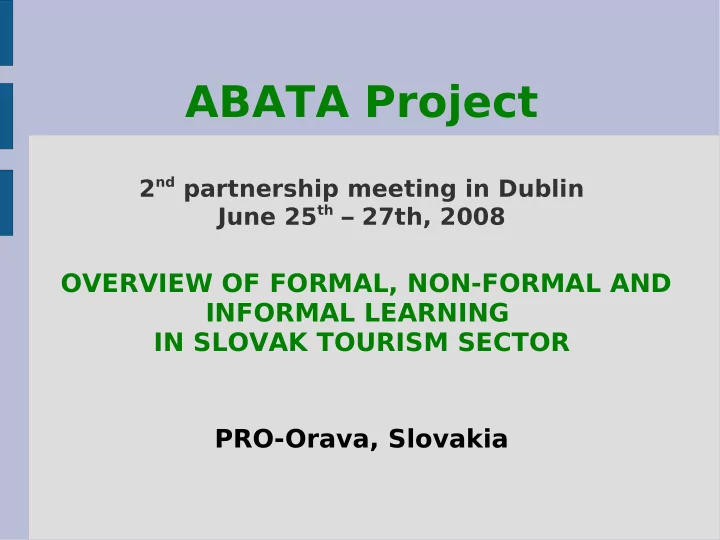

ABATA Project 2 nd partnership meeting in Dublin June 25 th – 27th, 2008 OVERVIEW OF FORMAL, NON-FORMAL AND INFORMAL LEARNING IN SLOVAK TOURISM SECTOR PRO-Orava, Slovakia
Types of schools preparing for work in tourism area – formal education - Secondary vocational schools – 24 schools (September 15, 2007), e. g.: Business Academies Hotel Academies - Universities – 3 universities (September 15, 2007)
Certification of formal education – formal documents ● Secondary schools (certificate – school leaving examination, GCSE - General Certificate of Secondary Education) ● Universities (university diploma – I., II. degree)
Hotel Academies - study fields ● Hotel and travel agencies management ● Hotel and travel agencies management – hotel management ● Hotel and travel agencies management – travel agencies management ● Hotel and travel agencies management – tourist information agencies management ● Hotel management, Gastronomy management
Business Academies - study fields ● Tourism ● Management of tourism ● Intercultural communication in tourism Types of exams: ● Written exams and tests ● Oral exams
Preparation for professions – secondary education ● Regional tourism middle managers ● Hotel managers (middle management) ● Travel agencies managers and operators ● Tourism guide and animator ● Waiter – waitress, Receptionist, Cook, Catering cook
Certified knowledge – secondary schools ● Economics ● Geography of tourism ● Hotel and gastronomy management ● International gastronomy ● Marketing ● Animation ● Tourism guidance ● Tourism services ● Congress center services ● Foreign languages ● Information technologies
Matej Bel University Banska Bystrica, Faculty of Economics – study fields ● Tourism ● Management of tourism ● Intercultural communication in tourism (5 years study)
University of Economics Bratislava, Faculty of Commerce – study fields ● Tourism and commerce business ● Tourism management (5-years study)
Presov University – study fields ● Tourism and hotel management (5-years study)
University study graduates - prepared for professions ● Qualified tourism enterprises managers (middle and top-management positions) ● Specialized for the field of tourism services, hospitality and catering included
Acquired and certified knowledge ● tourism economics ● controlling ● management and marketing, ● law ● integration processes and managerial communication in tourism ● commercial entrepreneurship ● technologies ● intercultural communication ● foreign languages
Forms of university study ● Full-time (attendance) ● Distance ● Combined Types of exams: ● Written exams and tests ● Oral exams
Non-formal learning – certification of competencies in tourism area ● Carried out beside the main education ● Complementary to formal education – added value within the educational process ● Organized at schools in addition to main activities ● Organized in companies – providing the additional training ● Certification of knowledge provided by: Training and educational institutions accredited by Ministry of education of Slovak Republic
Identification and recognition of non- formal learning – current legislation ● One of strategic priorities of Slovak Government's strategy for Life-long learning 2010 ● Partially comes under the Law No. 386/1997 (this law does not cover: - information system of further learning - monitoring and need analyses survey according to labour market requirements - quality management system - recognition of non-formal and informal learning results)
Identification and recognition of non-formal learning ● One of key elements of life-long learning ● Strengthening the status of life-long learning Two ways (proposed in prepared Draft Law – Life-long learning ): - Modularization and credit system (for non- formal learning programmes) - National Authority with defined competencies
Credit system ● Credits will be awarded to the individual for the learning outcomes ● Learning outcomes will be recognized and accumulated as a part of intended qualification ● Credit system will enable recognition and transfer of credits for: determined extent, the way of completion or for accomplished modules - to formal education (e. g. certificate of apprenticeship + number of accredited modules = meeting the conditions for General Certificate of Secondary Education)
National Authority with defined competencies ● National authority will assign credits for example: - 80 % for work experience – say 5 years in particular sector - 20 % can be obtained through the recognition of competencies (exam with assigned standard for knowledge and skills) by authorized corporate body
Formal documents - certification of non-formal learning outcomes ● Certificates ● Attestations
Certified professions ● Travel guide ● Cook ● Catering cook ● Waiter – waitress ● Receptionist ● Waiter/Barman ● Kitchen Assistant ● Touroperator ● Rural Environmental Manager ● Tourist Animator ● Sommelier
Standards for identification and assessment of outcomes - Formal education: professional standards educational standards assessment standards - Non-formal education: professional standards assessment standards
Informal education - certification of competencies in tourism area ● presently the less used education system ● based on natural abilities to learn ● it offers all conditions how to manage all practical activities in particular profession (learning by doing) ● this type of education is not officially certified
In-formal education ● Accreditation for courses provided as part of in- formal education and training – Ministry of education ● Accreditation is not required
Recommend
More recommend